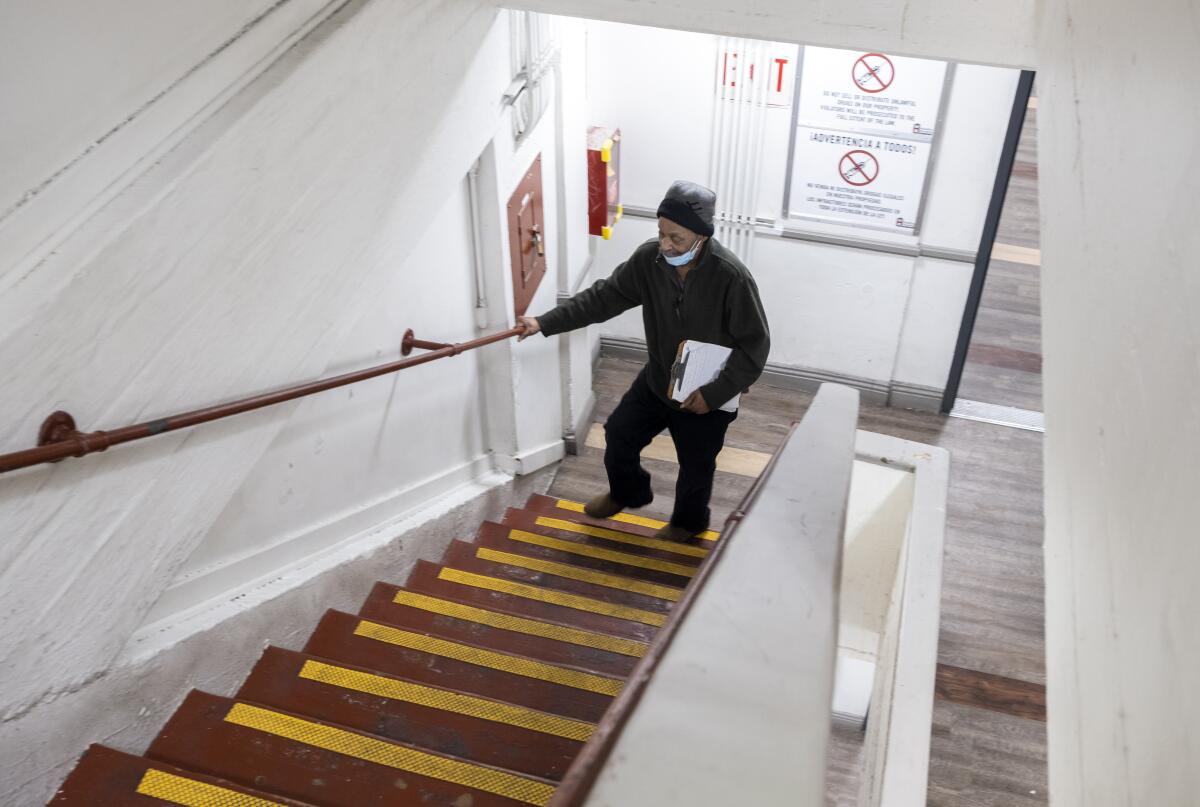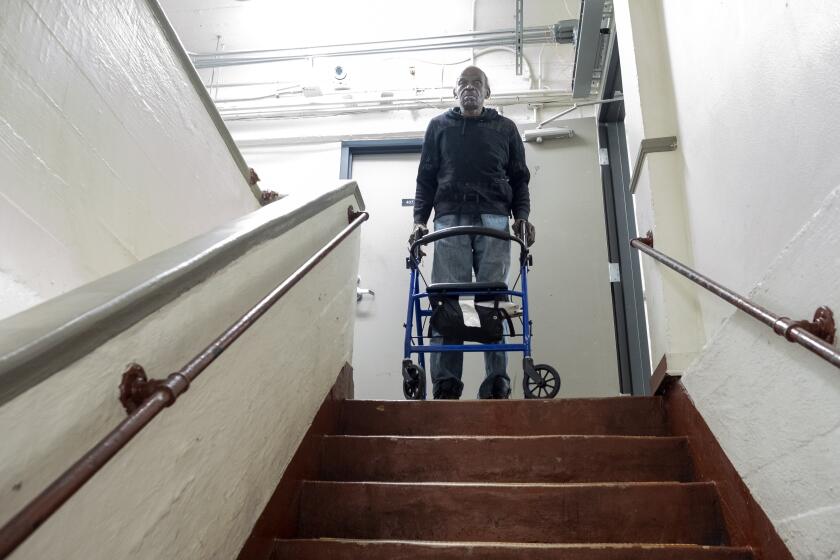Hotel residents settle dispute with AIDS Healthcare Foundation over elevator failures

- Share via
Tenants in a nearly century-old skid row residential hotel reached a settlement Wednesday in a lawsuit seeking to force its owner, the nonprofit AIDS Healthcare Foundation, to fix a chronically failing elevator.
Terms of the settlement, which came two days before the case was scheduled to go to trial, were not disclosed.
But documents filed in the case last month showed that the AIDS Healthcare Foundation signed a new $177,000 contract to repair the elevator in the five-story Madison Hotel and made a first payment of more than $88,000.
Previously, the foundation had settled with 13 tenants in the lawsuit, agreeing to pay a total of $832,000 in amounts ranging from $8,000 for those who settled first to between $80,000 and $120,000 for those who held out longer. The four tenants remaining in the case settled Wednesday.
The plaintiffs, who filed the lawsuit in March 2021, had sought damages for their suffering and punitive damages and a court order for the foundation to either replace the elevator or restore it to a reliable operating condition.
Annette Harings, an attorney for the tenants, confirmed that the matter had been resolved, but declined to comment further.
Foundation President Michael Weinstein said he was not at liberty to discuss settlement details but said, “We have felt from the beginning that settlement is the best solution.”
Weinstein said the foundation had spent $6 million rehabbing the Madison since purchasing it and had spent or committed $577,000 specifically on its elevator.
The AIDS Healthcare Foundation has spent tens of millions on pro-tenant causes. Yet elderly and disabled tenants at one of its buildings complain they have spent months at a time without a functioning elevator.
In the more than five years the foundation has owned the Madison, elevator outages have led residents, many of whom are elderly and infirm, to sleep in the lobby, pay other tenants to carry them to their rooms or remain trapped on the upper floors.
In 2018, after a blind tenant fell more than 12 feet down the open shaft, the elevator was out of service for seven months, according to Los Angeles city records and court testimony. It reopened but soon failed again, remaining broken for the better part of a year. Large-scale repairs started only after city building inspectors threatened to turn the case over to the city attorney’s office for a criminal investigation. Tenants have said the elevator continues to fail regularly, including when it was out of service for nearly a week in December.
The foundation is a global leader in AIDS treatment and advocacy, with nearly $2 billion in annual revenue earned largely from its chain of pharmacies and clinics. In 2017, it began purchasing residential hotels and apartment complexes in skid row and other neighborhoods in Los Angeles, arguing that it could provide homes for low-income residents more quickly, cheaply and humanely than private developers, public agencies and other nonprofits. It now owns more than a dozen such properties.
The first building the foundation purchased was the Madison, which cost $8 million. The elevator relies on the same basic mechanics as when it was built in 1924. Tenants and guests must slide open an exterior door and then a metal gate, both of which must be closed before the cab will start moving.
Problems predated the foundation’s ownership.
After the tenants filed their lawsuit, the foundation sued the previous owner, Kameron Segal, alleging that Segal defrauded them by not disclosing the elevator’s failures or a prior settlement that required immediate repairs when the elevator went out of service. The foundation also sued the city of Los Angeles and the L.A. Department of Water and Power, saying the city and public utility slow-walked permitting for needed elevator repairs and upgrades. Segal did not respond to the foundation’s lawsuit and a judge issued a default judgment against him. The public agencies agreed to pay the foundation $100,000 in December to settle their case, saying that doing so would save the expense of a lengthy trial.
In court filings prior to Wednesday’s settlement, the foundation said that it had already spent $400,000 to repair and maintain the elevator and that further efforts would be too costly and were unnecessary because they had offered to move affected tenants to lower floors in the Madison or to other properties.
But last month, on the same day a Times story about the Madison’s elevator and the lawsuit was published, a foundation executive signed the contract for the $177,000 in repairs and upgrades, court records show.
A class-action lawsuit against the foundation filed in March 2020 on behalf of current and former Madison tenants alleging overall uninhabitable conditions at the property remains pending.
More to Read
Sign up for Essential California
The most important California stories and recommendations in your inbox every morning.
You may occasionally receive promotional content from the Los Angeles Times.













